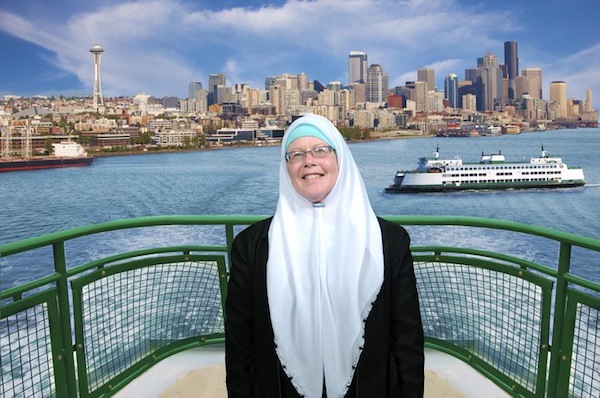Our “I’m An Advocate” blog series introduces you to people who are speaking up for an end to homelessness in different ways. Today we introduce you to Janice Tufte, who has over a decade of experience advocating on behalf of people living in poverty; her personal experience with homelessness informs her efforts.
Janice is the founder of the Islamic Civic Engagement Project, an organization that disseminates educational information and promotes the idea that everyone is able to make a positive change. She also founded Warm for Winter, a program that has not only collected over 33,000 winter scarves and hats for the homeless, but also raised awareness about housing and homelessness issues. Janice has served on the board of the Interfaith Task Force on Homelessness, and the public relations and legislative and advocacy sub-committees of the Committee to End Homelessness in King County. In addition to her tremendous volunteer work, Janice offers educational consulting and social research services through her company, Hassanah.
How do you define advocacy?
Communicating through words, writing and/or art, a vision or ideal you are sharing with others, in hopes that they might also join hands in current collaborative efforts with you.
Why are you a housing advocate?
Housing is the basis of stability for every individual and family. It should be a place where you are able to feel secure when you lock your door; it is yours alone for you to enjoy and revel in. We need rental protections and affordable low-income housing to effectively tackle homelessness and poverty in the U.S. In this last decade, housing has been exploited as a corporate financial opportunity to create and implement exotic financial schemes that have hurt millions of Americans. Trickle down bad economic policy and “creative financial instruments” have literally left millions of Americans strapped in bad debt and/or without homes.
What methods do you use to advocate for housing?
I educate on housing issues, I disseminate up-to-date information, and I encourage others to participate in advocacy through calls, e-mails, letter writing or by directly speaking to their elected official in person. All are effective tools to have your concerns on issues heard.
What’s your favorite advocacy success story?
Six years ago I started the Islamic Civic Engagement Project, which created and distributed a “How to Contact Your Elected Official” brochure. We held advocacy 101 workshops with experts. That fall, we collected issue papers signed by district constituents supporting the Housing Trust Fund; Transitional Housing, Operating, and Rent (THOR) program; payday loan regulation; and health care coverage for all children. Over 500 signed issue papers were delivered into 19 districts that Martin Luther King Day. These all passed through the legislature over the next three years.
Now there are hundreds of Muslims attending the Martin Luther King Day advocacy day in Olympia. The Muslims Day at the Capitol no longer focuses on housing concerns as their primary asks, but I continue to send out information on housing concerns. I continue to work on policy, though I’m no longer organizing.
What challenges do you encounter in advocating for housing, and how do you overcome them?
Some elected officials have non-supportive comments on housing-related legislative concerns. Being respectful and thanking them for their time will leave a positive impression on them.
What advice would you give to someone who is interested in advocating but doesn’t know where to begin?
Always remember that your voice makes a difference, and that your elected officials are voted into office to work for you and citizens in their jurisdiction. Your elected officials are here to listen and respond to your concerns and needs. Your voice, your stories are very important to them; they will listen and hopefully positive action will follow.
Is there anything you’d like to add?
The housing advocates have been very effective in their ongoing advocacy efforts, passing legislative work that has benefited the lowest-income individuals in Washington state. Through our voices and work, we will continue to be effective.
Read more “I’m An Advocate” interviews:
Norene Roberts, program manager at The Salvation Army’s Catherine Booth House, a confidentially located domestic violence shelter for women and children
Kim Herman, Executive Director of the Washington State Housing Finance Commission
Kay Field, founder of the free family law clinic at YWCA Pathways for Women
Who should we feature next? Share your suggestions by posting a comment below!
